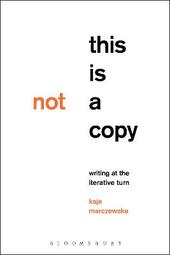
|
This Is Not a Copy: Writing at the Iterative Turn
Hardback
Main Details
| Title |
This Is Not a Copy: Writing at the Iterative Turn
|
| Authors and Contributors |
By (author) Dr. Kaja Marczewska
|
| Physical Properties |
| Format:Hardback | | Pages:320 | | Dimensions(mm): Height 229,Width 152 |
|
| Category/Genre | Theory of art
Literary theory
Literary studies - from c 1900 - |
|---|
| ISBN/Barcode |
9781501337833
|
| Classifications | Dewey:808.02 |
|---|
| Audience | | Tertiary Education (US: College) | | Undergraduate | |
|---|
| Illustrations |
21 bw illus
|
|
Publishing Details |
| Publisher |
Bloomsbury Publishing Plc
|
| Imprint |
Bloomsbury Academic USA
|
| Publication Date |
22 February 2018 |
| Publication Country |
United States
|
Description
In This Is Not a Copy, Kaja Marczewska identifies a characteristic 'copy-paste' tendency in contemporary culture-a shift in attitude that allows reproduction and plagiarizing to become a norm in cultural production. This inclination can be observed in literature and non-literary forms of writing at an unprecedented level, as experiments with text redefine the nature of creativity. Responding to these transformations, Marczewska argues that we must radically rethink our conceptions of artistic practice and proposes a move away from the familiar categories of copying and originality, creativity and plagiarism in favour of the notion of iteration. Developing the new concept of the Iterative Turn, This Is Not a Copy identifies and theorizes the turn toward ubiquitous iteration as a condition of text-based creative practices as they emerge in response to contemporary technologies. Conceiving of writing as iterative invites us to address a set of new, critical questions about contemporary culture. Combining discussion of literature, experimental and electronic writing, mainstream and independent publishing with debates in 20th- and 21st-century art, contemporary media culture, transforming technologies and copyright laws, This Is Not a Copy offers a timely and urgently needed argument, introducing a unique new perspective on practices that permeate our contemporary culture.
Author Biography
Kaja Marczewska is Lecturer in English and Visual Culture at the University of Westminster, London, UK. Her research focuses on experimental arts and writing, print culture and innovative forms of publishing, contemporary aesthetics, and intersections of art, technology and law.
ReviewsIt should be reiterated: this original and creative account of the 'unoriginal genius' behind 'uncreative writing' is not merely another contribution to the critical literature on conceptual, code-based, and partially-erased poetry. Rather, This Is Not A Copy rethinks the very concepts of copying and authorship themselves. We live now in a world where iteration is the fundamental mode of engaging culture. Rather than start from problems (whether ethical, legal, or aesthetic), Marczewska thus starts with a solution. More than an reckoning of the recent past, this book is a way forward. * Craig Dworkin, Professor of English, University of Utah, USA * Focusing on various forms of iteration (including erasure, transcription, curation, assemblage, and digital coding) Kaja Marczewska's outstanding study should prove to be the gold standard for teachers and students who are interested in exploring how contemporary poets and artists have engaged with an avant-garde tradition of conceptualism to rethink traditional Romantic (Lockean) ideas of creativity and authorship, and to ask tough questions about how transformative a text must be (or should need to be) to avoid copyright infringement. Thorough, informed, soundly interpreted, and it is hard to imagine a book more up-to-date or concerning a movement that is more of-the-moment. * Daniel Morris, Professor of English, Purdue University, USA * In This Is Not a Copy, Kaja Marczewska demarcates with great intelligence and careful scholarship the history of an aesthetic shift, the Iterative Turn that affords us an understanding of an expanded form of writing demanding an alternative skill set and including copying as an act of writing in and of itself. Marczewska breaks down for us three experimental approaches to writing that dominate the contemporary avant-garde poetic scene: erasure, transcription and coding. She links these to earlier avant-garde moments and suggests that the iteration is not just defined at the level of material reproduction but in terms of repeating existing artistic procedures as well. Both are made in direct response to a technologically driven society of postproduction where information is constantly being selected and reframed to generate new meanings in order to disrupt the existing order of things. Iterative writing is presented as a complex system of creative practice and critical thought. This book is essential for readers with 'aesthetic attitude' who think about the limits of literature and the creative potential of writing in the digital age. * Simon Morris, Director of Research in the School of Art, Architecture and Design, Leeds Beckett University, UK *
|